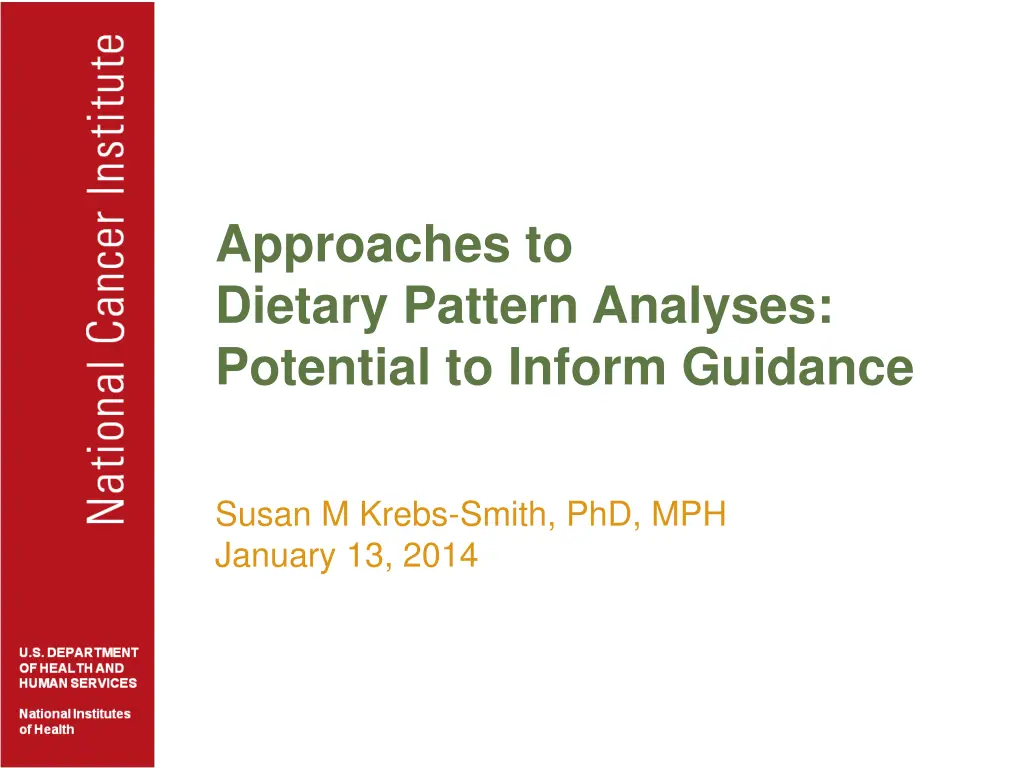
Understanding Dietary Patterns for Informed Nutrition Guidance
Explore the concept of dietary patterns, methods for analysis, and their significance in shaping nutrition advice. Delve into the definitions, quantities, and combinations of foods to gain insights for better health choices.
Download Presentation

Please find below an Image/Link to download the presentation.
The content on the website is provided AS IS for your information and personal use only. It may not be sold, licensed, or shared on other websites without obtaining consent from the author. If you encounter any issues during the download, it is possible that the publisher has removed the file from their server.
You are allowed to download the files provided on this website for personal or commercial use, subject to the condition that they are used lawfully. All files are the property of their respective owners.
The content on the website is provided AS IS for your information and personal use only. It may not be sold, licensed, or shared on other websites without obtaining consent from the author.
E N D
Presentation Transcript
Approaches to Dietary Pattern Analyses: Potential to Inform Guidance Susan M Krebs-Smith, PhD, MPH January 13, 2014
Acknowledgements L Beth Dixon Suzen M Moeller Patricia M Guenther PK Newby Kurt Hoffman Jill Reedy Angela Liese Mathias Schulze Amy E Millen Katherine L Tucker Paige Miller
Outline What do we mean by dietary patterns, and why are we interested? What are the primary methods for studying dietary patterns, and what questions do they address? How do methodological considerations affect results? What questions, if answered, could inform guidance? Challenges ahead
Definition of dietary patterns The quantities, proportions, variety or combination of different foods, drinks, and nutrients in diets, and the frequency with which they are habitually consumed* * Nutrition Evidence Library, Technical Expert Collaborative on Study of Dietary Patterns
Definition of dietary patterns The quantities, proportions, variety or combination of different foods, drinks, and nutrients in diets, and the frequency with which they are habitually consumed* * Nutrition Evidence Library, Technical Expert Collaborative on Study of Dietary Patterns
Definition of dietary patterns The quantities, proportions, variety or combination of different foods, drinks, and nutrients in diets, and the frequency with which they are habitually consumed* * Nutrition Evidence Library, Technical Expert Collaborative on Study of Dietary Patterns
Definition of dietary patterns The quantities, proportions, variety or combination of different foods, drinks, and nutrients in diets, and the frequency with which they are habitually consumed* * Nutrition Evidence Library, Technical Expert Collaborative on Study of Dietary Patterns
Why study dietary patterns? Complexity of diet Correlation among dietary constituents Evidence for positive health outcomes with changes in total diet Relevance for policy and guidance
Surveillance Policy-related Analyses Dietary Patterns Epidemiology Interventions
Investigator- Defined Dietary Patterns Methods Data-Driven, Outcome-Independent Data-Driven, Outcome-Dependent
Selective Diets Investigator- Defined Indexes/ Scores Data-Driven, Outcome- Independent Dietary Patterns Methods Data-Driven, Outcome- Dependent
Are you a vegetarian? Selective Diets (e.g., Vegetarian)
Are you a vegetarian? Selective Diets (e.g., Vegetarian) Yes!
Are you a vegetarian? Selective Diets (e.g., Vegetarian) Exclude Meat Fish Poultry (Eggs) (Milk) Include Fruits? Vegetables? Whole grains? Refined grains? Added sugars? Solid fats? Yes!
How close is the population to meeting a set of dietary recommendations? Indexes/Scores
How close is the population to meeting a set of dietary recommendations? Indexes/Scores Overall Diet Quality: Total score = 58/100
How close is the population to meeting a set of dietary recommendations? Indexes/Scores Pattern: 20 Overall Diet Quality: Total score = 58/100 15 10 5 0
Indexes/Scores Characterize the total diet Intuitively appealing and relatively simple to compute Results are interpretable Reproducible across studies Scoring algorithms affect results
Special Diet Investigator- Defined Indexes/ Scores Dietary Patterns Methods Cluster Analysis Data-Driven, Outcome- Independent Factor Analysis Data-Driven, Outcome- Dependent
Are there groups of people with distinct eating patterns? Cluster Analysis
Are there groups of people with distinct eating patterns? Cluster Analysis Groups people according to their dietary patterns
What elements of the diet track together in explaining variation in diets? Factor Analysis
What elements of the diet track together in explaining What are the dietary patterns in this population? variation in diets? Factor Analysis Factor 1 Factor 2 Factor 3 Red meat Salads Cereal Potatoes Yogurt Milk Soft drinks Nuts and seeds Fruit Identifies elements of the diet that track together
Cluster Analysis Factor Analysis Characterize the total diet Results are interpretable Limited reproducibility across studies
Selective Diets People who meet/don t meet criteria Hypothesis Testing Indexes/ Scores Individuals scores on quality and its components How do dietary patterns relate to health outcome? Cluster Analysis Groups of individuals and their diet patterns Factor Analysis Factors explaining variation in individuals scores
Special Diet Investigator- Defined Indexes/ Scores Cluster Analysis Data-Driven, Outcome- Independent Dietary Patterns Methods Factor Analysis Reduced Rank Regression Data-Driven, Outcome- Dependent CART
What combination of foods explains the most variation in a set of intermediate health markers? Reduced Rank Regression
What combination of foods explains the most variation in a set of intermediate health markers? Reduced Rank Regression Reduced Rank Reduction fg1 Food group 1 Score 1 fg2 Food group 2 Response 1 Food group 3 fg3 Food group 4 Response 2 Disease . fg4 . Response 3 . Score 2 fg5 Food group x Response 4 Prior Knowledge fg6
What dietary components explain the most variation in a health outcome? CART
What dietary components explain the most variation in a health outcome? CART Total diet High added sugars Low added sugars High solid fats Low solid fats High fruit Low fruit Hypothetical example of CART results
Selective Diet Investigator- Defined Indexes/ Scores Cluster Analysis Data-Driven, Outcome- Independent Dietary Patterns Methods Factor Analysis Reduced Rank Regression Data-Driven, Outcome- Dependent CART
Data collection method Food frequency questionnaires Represent long-range intake Cognitively difficult, so accuracy is diminished Traditionally, only affordable method for large- scale studies 24-hour recalls Represent short-term intake Requires modeling to estimate usual intake Captures details New tools make them affordable
Time frame of reference Meal Day Month Year
Diet over the life course Adulthood (including pregnancy and lactation) Older Adulthood In Utero Childhood Adolescence
Diet as dynamic exposure Meal Day Month Year In utero Childhood Adolescence Adulthood Older Adulthood
New technologies Offer capability to capture streams of data
Food categories or food groups? Food groups Food categories Pasta dishes Macaroni and cheese Burritos, tacos Stir-fry mixtures Pizza Cereal, high sugar Cereal, low sugar Lettuce salads Etc. Whole fruit Fruit juice Whole grain Refined grain Hi-omega 3 fish Low-omega 3 fish Added sugars Solid fats Etc.
Food as eaten (Food Categories) Sandwich Bread, whole grain Ingredients Cheese Ham Whole grain equivalents Dairy Lean meat equivalents Food Patterns Equivalents Database (FPED) (Food Groups) equivalents Solid fat grams Solid fat grams
Subjectivity Choice of variables Treatment of input variables Labeling of patterns Scoring algorithms Determination of min/max Truncation Weighting to derive total score
Population being examined Data-driven methods may not derive comparable patterns in different populations Investigator-driven methods will always identify patterns in same way, although prevalences will vary among populations Many cohort studies, each with different populations, have used different indices/scores
Dietary Patterns Methods Project Standardized Measures Mediterranean Diet Score NIH/AARP Diet and Health Study Analyses examining diet quality indices and their associations with mortality Healthy Eating Index Multiethnic Cohort Study Alternate Healthy Eating Index Women s Health Initiative DASH Scores






















